Russia is celebrating its victory day today (Tuesday, 9 May). The country is witnessing muted celebrations in the backdrop of the Ukraine war and fears over Ukrainian attacks have led many events around Russia to be cancelled – though the parade in Moscow’s Red Square was held. Putin, who has become the target of an International Criminal Court arrest warrant, told his troops in Red Square that a ‘real war is being waged against the motherland’ and that civilisation is at a ‘turning point’. But why is Victory Day so important for Russia? Let’s take a closer look: The holiday commemorates the victory of the Soviet Union over Nazi Germany in World War II. While the Allies celebrated 7 May as Victory in Europe Day, Joseph Stalin waited until the Nazis in Berlin had signed the text of surrender on 9 May. [caption id=“attachment_12569332” align=“alignnone” width=“640”]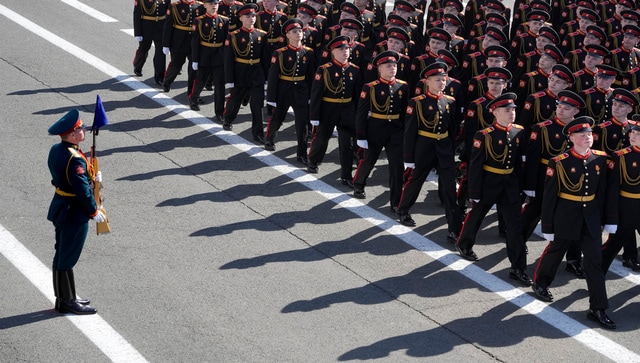 Military cadets march during the Victory Day military parade at Dvortsovaya (Palace) Square. AP[/caption] Tuesday marks the 78th anniversary of Germany’s capitulation in World War II after a relentless Red Army offensive pushed German forces from Stalingrad, deep inside Russia, all the way to Berlin, about 2,200 kilometers. The Soviet Union lost at least 20 million people in the war; the suffering and valour that went into the German defeat have been touchstones ever since. According to Al Jazeera, the holiday was first marked in 1965 by Soviet leader Leonid Brezhnev – himself a veteran of World War II. This, the country’s most spectacular and high-profile parade, is held outside the Kremlin with soldiers marching perfectly in unison, vintage tanks and missiles passing through the iconic Red Square, according to The New York Times. Ivan I. Kurilla, a professor at the European University of St. Petersburg, told the newspaper that acknowledging the blood spilled by Russians in World War II “is probably the only social glue to form a single society”. Interestingly, the holiday was only sporadically marked afterward by the Soviet Union, according to the BBC. [caption id=“attachment_12569362” align=“alignnone” width=“640”]
Military cadets march during the Victory Day military parade at Dvortsovaya (Palace) Square. AP[/caption] Tuesday marks the 78th anniversary of Germany’s capitulation in World War II after a relentless Red Army offensive pushed German forces from Stalingrad, deep inside Russia, all the way to Berlin, about 2,200 kilometers. The Soviet Union lost at least 20 million people in the war; the suffering and valour that went into the German defeat have been touchstones ever since. According to Al Jazeera, the holiday was first marked in 1965 by Soviet leader Leonid Brezhnev – himself a veteran of World War II. This, the country’s most spectacular and high-profile parade, is held outside the Kremlin with soldiers marching perfectly in unison, vintage tanks and missiles passing through the iconic Red Square, according to The New York Times. Ivan I. Kurilla, a professor at the European University of St. Petersburg, told the newspaper that acknowledging the blood spilled by Russians in World War II “is probably the only social glue to form a single society”. Interestingly, the holiday was only sporadically marked afterward by the Soviet Union, according to the BBC. [caption id=“attachment_12569362” align=“alignnone” width=“640”]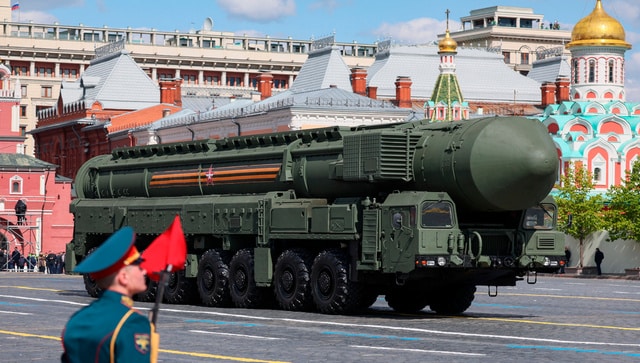 A Russian army RS-24 Yars ballistic missile makes its way through the Red Square during the Victory Day military parade. AP[/caption] It was then president Boris Yeltsin who gave the holiday a new lease of life in 1995 – on its 50th anniversary. Since coming to power in 2000, Putin has stoked patriotic fervour around the 1945 Soviet victory over the Nazis, boosting his standing as the heir of Soviet power. Russian school and history books also focus on the importance Victory Day and show Moscow as the saviour of Europe.
A Russian army RS-24 Yars ballistic missile makes its way through the Red Square during the Victory Day military parade. AP[/caption] It was then president Boris Yeltsin who gave the holiday a new lease of life in 1995 – on its 50th anniversary. Since coming to power in 2000, Putin has stoked patriotic fervour around the 1945 Soviet victory over the Nazis, boosting his standing as the heir of Soviet power. Russian school and history books also focus on the importance Victory Day and show Moscow as the saviour of Europe.
However, scholars say the true significance of the day has been obscured.
Stephen Norris, professor of Russian history at the University of Miami, told Al Jazeera, “Victory in World War II became the defining myth in post-war Soviet life, outstripping even the Revolution in its significance.” Norris added that the win validated the massive blood Russia spilled during World War II. [caption id=“attachment_12569382” align=“alignnone” width=“640”]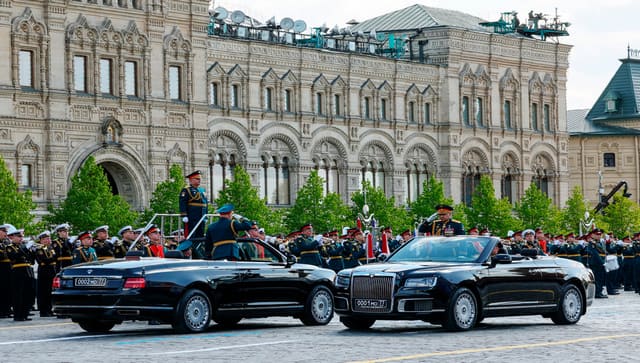 Russian defense minister Sergei Shoigu, right, salutes his soldiers as he is driven along Red Square in the Aurus Senat car during the Victory Day military parade. AP[/caption] “Nobel-Prize-winning author Svetlana Alexievich has captured this well, by stating the history of victory replaced the history of the actual war,” Norris added. “The Stalin regime was almost as criminal as the Hitler regime,” scholar Nikolay Koposov told a Wilson Center webcast in 2020, as per Time magazine. “And most Russians do not realize that the war was not for their freedoms but was largely a battle between the two dictators.” Victory Day is Russia’s most important secular holiday. It celebrates two tenets that are central to Russian identity – military might and moral rectitude. But the war in Ukraine undermines Russia’s claim to both this year. Ukraine in 2015 symbolically shifted the day to 8 May – when Europe remembers the day, as per Al Jazeera. On Monday, Zelensky said he had submitted a bill to parliament to formally commemorate World War II in Ukraine on 8 May. The Ukrainian leader said the country would mark a separate Europe Day on 9 May, promoting peace and unity on the continent. The Kremlin has also used the memory of the Soviet war effort to justify its offensive in Ukraine, claiming it is fighting “fascists” supported by the West. [caption id=“attachment_12569422” align=“alignnone” width=“640”]
Russian defense minister Sergei Shoigu, right, salutes his soldiers as he is driven along Red Square in the Aurus Senat car during the Victory Day military parade. AP[/caption] “Nobel-Prize-winning author Svetlana Alexievich has captured this well, by stating the history of victory replaced the history of the actual war,” Norris added. “The Stalin regime was almost as criminal as the Hitler regime,” scholar Nikolay Koposov told a Wilson Center webcast in 2020, as per Time magazine. “And most Russians do not realize that the war was not for their freedoms but was largely a battle between the two dictators.” Victory Day is Russia’s most important secular holiday. It celebrates two tenets that are central to Russian identity – military might and moral rectitude. But the war in Ukraine undermines Russia’s claim to both this year. Ukraine in 2015 symbolically shifted the day to 8 May – when Europe remembers the day, as per Al Jazeera. On Monday, Zelensky said he had submitted a bill to parliament to formally commemorate World War II in Ukraine on 8 May. The Ukrainian leader said the country would mark a separate Europe Day on 9 May, promoting peace and unity on the continent. The Kremlin has also used the memory of the Soviet war effort to justify its offensive in Ukraine, claiming it is fighting “fascists” supported by the West. [caption id=“attachment_12569422” align=“alignnone” width=“640”]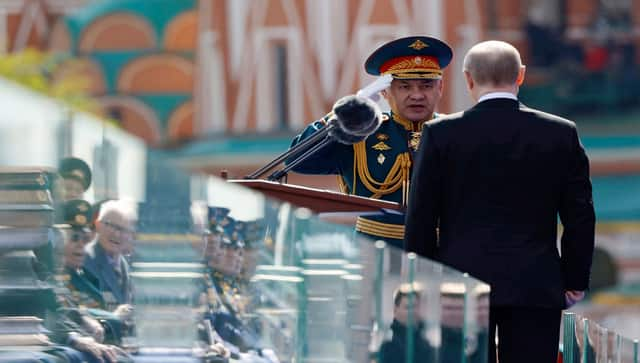 Russian President Vladimir Putin, right, and Russian defense minister Sergei Shoigu attend the Victory Day military parade. AP[/caption] Parade occurs amid heightened security The famed parade in Moscow’s Red Square took place after Russia’s claim of an attempted Ukrainian drone attack on the Kremlin, whose spires loom next to the parade venue, but amid ramped-up security measures. Moscow sought to project a show of force during its flagship parade on Red Square, with top-notch military equipment rumbling through it and leaders of ex-Soviet nations standing beside President Vladimir Putin. Initially, only one of them — Kyrgyz President Sadyr Zhaparov — was expected to attend, but at the last minute on Monday officials confirmed that leaders of Armenia, Belarus, Kazakhstan, Tajikistan, Turkmenistan and Uzbekistan were heading to Moscow as well. [caption id=“attachment_12569392” align=“alignnone” width=“640”]
Russian President Vladimir Putin, right, and Russian defense minister Sergei Shoigu attend the Victory Day military parade. AP[/caption] Parade occurs amid heightened security The famed parade in Moscow’s Red Square took place after Russia’s claim of an attempted Ukrainian drone attack on the Kremlin, whose spires loom next to the parade venue, but amid ramped-up security measures. Moscow sought to project a show of force during its flagship parade on Red Square, with top-notch military equipment rumbling through it and leaders of ex-Soviet nations standing beside President Vladimir Putin. Initially, only one of them — Kyrgyz President Sadyr Zhaparov — was expected to attend, but at the last minute on Monday officials confirmed that leaders of Armenia, Belarus, Kazakhstan, Tajikistan, Turkmenistan and Uzbekistan were heading to Moscow as well. [caption id=“attachment_12569392” align=“alignnone” width=“640”]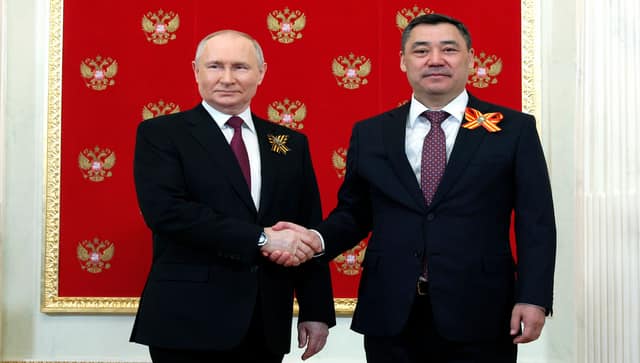 Russian president Vladimir Putin, left, and Kyrgyzstan president Sadyr Japarov shake hands at their meeting. AP[/caption] Political analyst Arkady Dubnov said that “for the first time in many years” Putin will be surrounded at a Victory Day parade by a number of post-Soviet leaders. “Despite the serious weakening of its global positions after 24 February, 2022, Russia remains to a certain extent the metropolis of a former empire whose actions have to be taken into account,” Dubnov said. Still, the parade looked more modest than usual: There were no military aircraft flying over Red Square, and fewer pieces of military equipment were displayed. For the first time in years, the parade ended in under an hour. Amid the heightened security worries, authorities also cancelled one of Victory Day’s most notable observances, the “Immortal Regiment” processions in which throngs of citizens take to the streets holding portraits of relatives who died or served in World War II. [caption id=“attachment_12569442” align=“alignnone” width=“640”]
Russian president Vladimir Putin, left, and Kyrgyzstan president Sadyr Japarov shake hands at their meeting. AP[/caption] Political analyst Arkady Dubnov said that “for the first time in many years” Putin will be surrounded at a Victory Day parade by a number of post-Soviet leaders. “Despite the serious weakening of its global positions after 24 February, 2022, Russia remains to a certain extent the metropolis of a former empire whose actions have to be taken into account,” Dubnov said. Still, the parade looked more modest than usual: There were no military aircraft flying over Red Square, and fewer pieces of military equipment were displayed. For the first time in years, the parade ended in under an hour. Amid the heightened security worries, authorities also cancelled one of Victory Day’s most notable observances, the “Immortal Regiment” processions in which throngs of citizens take to the streets holding portraits of relatives who died or served in World War II. [caption id=“attachment_12569442” align=“alignnone” width=“640”]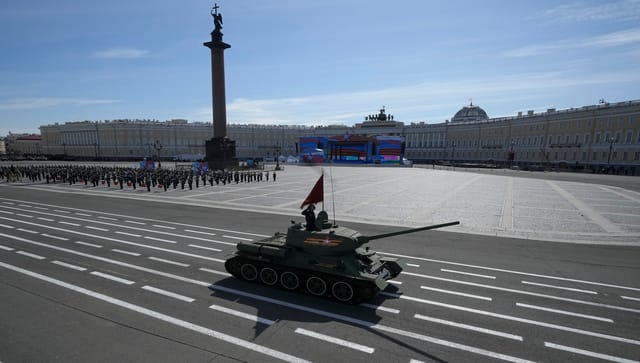 A World War II ages Soviet army T-34 tank rolls during the Victory Day military parade. AP[/caption] These processions carry an air of genuine emotion, in sharp contrast to the obedient stone-faced soldiers who march across Red Square during the tightly regimented military parades that change little from year to year. Some speculated, however, that the reason behind cancelling Immortal Regiment marches was the fact that Russians might bring portraits of relatives who died in Ukraine to those processions, illustrating the scale of Russia’s losses in the drawn-out conflict. “People will not come out with portraits of their great-grandfathers,” political activist Elvira Vikhareva wrote on Facebook as per The New York Times. “People will come out with portraits of their fathers, sons and brothers. The regiment will not turn out to be ‘immortal,’ but very much mortal, and the scale will be visible.” The use of drones has been once again banned in the Russian capital, and car sharing services have been temporarily barred from the city center, with users unable to start or finish rides there. In St. Petersburg, Russia’s second-largest city, the authorities also banned the use of drones ahead of a parade. In some parts of the city’s extensive network of rivers and canals, the use of jet skis has also been forbidden. [caption id=“attachment_12569322” align=“alignnone” width=“640”]
A World War II ages Soviet army T-34 tank rolls during the Victory Day military parade. AP[/caption] These processions carry an air of genuine emotion, in sharp contrast to the obedient stone-faced soldiers who march across Red Square during the tightly regimented military parades that change little from year to year. Some speculated, however, that the reason behind cancelling Immortal Regiment marches was the fact that Russians might bring portraits of relatives who died in Ukraine to those processions, illustrating the scale of Russia’s losses in the drawn-out conflict. “People will not come out with portraits of their great-grandfathers,” political activist Elvira Vikhareva wrote on Facebook as per The New York Times. “People will come out with portraits of their fathers, sons and brothers. The regiment will not turn out to be ‘immortal,’ but very much mortal, and the scale will be visible.” The use of drones has been once again banned in the Russian capital, and car sharing services have been temporarily barred from the city center, with users unable to start or finish rides there. In St. Petersburg, Russia’s second-largest city, the authorities also banned the use of drones ahead of a parade. In some parts of the city’s extensive network of rivers and canals, the use of jet skis has also been forbidden. [caption id=“attachment_12569322” align=“alignnone” width=“640”]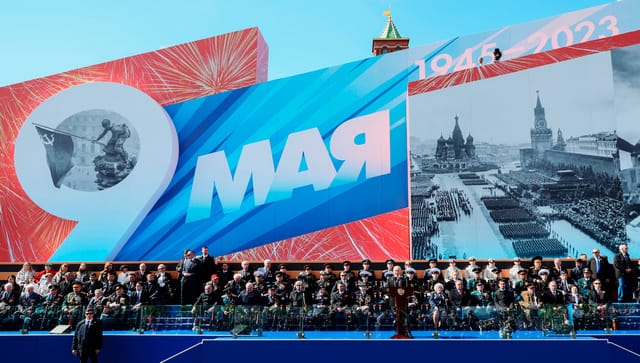 Russian President Vladimir Putin delivers his speech during the Victory Day military parade marking the 78th anniversary of the end of World War II in Red square in Moscow. AP[/caption] Although the processions are moving and impressively large, authorities “thought that the risks were becoming prohibitive,” said Russian analyst Dmitry Oreshkin, now at the Free University in Riga, Latvia. “If some kind of drones fly there, penetrate through the impenetrable border … then why can’t they drop something on this column?” For all the fearsome armaments that will growl through Moscow’s most famous square, Russia’s failure to make gains in Ukraine spoils the image of its army’s indomitability. After seizing sizable parts of the neighbouring country in the opening weeks of the invasion, the Russians abandoned an attempt to enter Kyiv, retreated in parts of northern and southern Ukraine, and failed to take Bakhmut, a small city of questionable value, despite months of exceptionally gruesome fighting. But the missiles that rain down on Ukrainian civilian targets have drawn worldwide condemnation of Russia, while the Western countries that made common cause with Moscow to defeat Nazi Germany send billions of dollars’ worth of weapons to Ukraine. But Putin remains defiant. “Today civilization is once again at a decisive turning point,” Putin told his troops at Red Square.
Russian President Vladimir Putin delivers his speech during the Victory Day military parade marking the 78th anniversary of the end of World War II in Red square in Moscow. AP[/caption] Although the processions are moving and impressively large, authorities “thought that the risks were becoming prohibitive,” said Russian analyst Dmitry Oreshkin, now at the Free University in Riga, Latvia. “If some kind of drones fly there, penetrate through the impenetrable border … then why can’t they drop something on this column?” For all the fearsome armaments that will growl through Moscow’s most famous square, Russia’s failure to make gains in Ukraine spoils the image of its army’s indomitability. After seizing sizable parts of the neighbouring country in the opening weeks of the invasion, the Russians abandoned an attempt to enter Kyiv, retreated in parts of northern and southern Ukraine, and failed to take Bakhmut, a small city of questionable value, despite months of exceptionally gruesome fighting. But the missiles that rain down on Ukrainian civilian targets have drawn worldwide condemnation of Russia, while the Western countries that made common cause with Moscow to defeat Nazi Germany send billions of dollars’ worth of weapons to Ukraine. But Putin remains defiant. “Today civilization is once again at a decisive turning point,” Putin told his troops at Red Square.
“A real war has been unleashed against our Motherland.”
Since Russia invaded its neighbour more than 14 months ago, Putin has repeatedly framed the war in Ukraine as a proxy conflict with the West. The Kremlin’s official narrative of the war has painted a picture of an existential conflict with the West, which in Moscow’s view is merely using Ukraine as a tool to destroy Russia, re-write its history and crush its traditional values. That version of events has dominated Russian state media coverage of the war. [caption id=“attachment_12569472” align=“alignnone” width=“640”]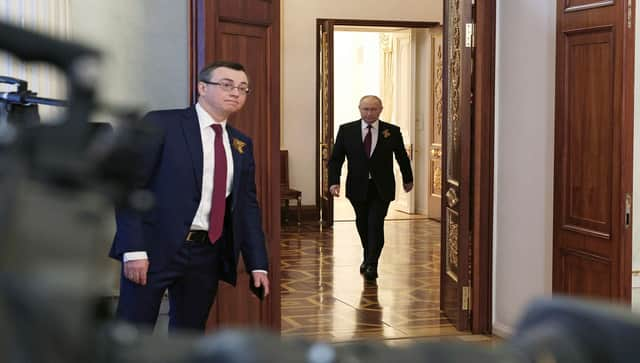 Russian president Vladimir Putin, right, enters a hall during celebrations of the 78th anniversary of the end of World War II in Kremlin. AP[/caption] In his speech, Putin insisted that the West’s “untamed ambitions, arrogance and impunity” are to blame for the conflict. Putin welcomed soldiers fighting in Ukraine who were present at the parade. “To Russia! To our brave armed forces! To Victory!” Putin said concluding the speech. With inputs from agencies Read all the
Latest News
,
Trending News
,
Cricket News
,
Bollywood News
, India News
and
Entertainment News
here. Follow us on
Facebook
,
Twitter
and
Instagram
.
Russian president Vladimir Putin, right, enters a hall during celebrations of the 78th anniversary of the end of World War II in Kremlin. AP[/caption] In his speech, Putin insisted that the West’s “untamed ambitions, arrogance and impunity” are to blame for the conflict. Putin welcomed soldiers fighting in Ukraine who were present at the parade. “To Russia! To our brave armed forces! To Victory!” Putin said concluding the speech. With inputs from agencies Read all the
Latest News
,
Trending News
,
Cricket News
,
Bollywood News
, India News
and
Entertainment News
here. Follow us on
Facebook
,
Twitter
and
Instagram
.
Deven Kanal kicked off his media career at Reader's Digest after graduating from The Times School of Journalism. With more than 13 years of work experience in the media, he has written on a variety of subjects — from human interest stories to sports, politics and pop culture
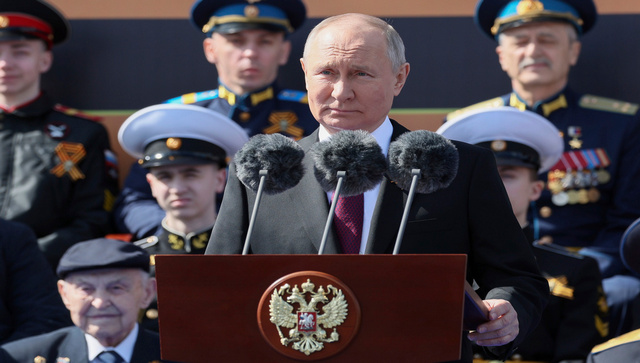)